
Workshop
on Challenges and Countermeasures of Global Reservoir Sedimentation
Successfully Held on May 20, 2025 to celebrate IHP’s 50th
Anniversary
On May 20, 2025, a Workshop on
Challenges and Countermeasures of Global Reservoir Sedimentation was held in Chengdu,
Sichuan Province, as an International Sediment Initiative (ISI) Event at the 28th
Congress and 93rd Annual Meeting of the International Commission on
Large Dams (ICOLD), in conjunction with the IHP's 50 anniversary celebration.
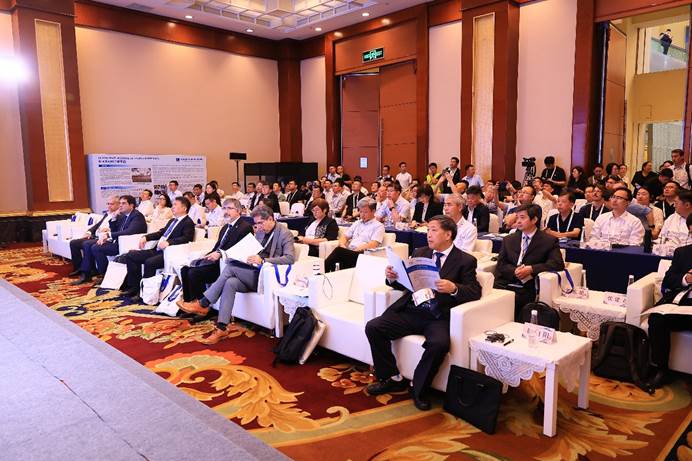
The workshop on Challenges
and Countermeasures of Global Reservoir Sedimentation
The workshop was jointly hosted by
the Yellow River Institute of Hydraulic Research (YRHR)
of the Yellow River Conservancy Commission (YRCC), the
International Research and Training Center on Erosion and Sedimentation
(IRTCES) under the auspices of UNESCO, China Communications Construction
Company Dredging Group Co., Ltd. (CCCC Dredging Group), the Intergovernmental
Hydrological Programme (IHP) of UNESCO, the ICOLD Technical Committee on Reservoir
Sedimentation, etc.
More than 100 Representatives from
the Ministry of Water Resources of China, domestic and international research
institutions, universities, enterprises, and water-related international
organizations participated in the event.
In
the opening session, Mr. Qun Li stated that climate change has become one of
the most severe challenges facing the world in recent years. Against this
backdrop, reservoir sedimentation has triggered a series of ecological and
environmental issues, emerging as a global problem. He expressed hope that
through exchanges of theoretical achievements, technological innovations, and
practical explorations in reservoir sediment reduction and dredging,
participants could reach important consensus, formulate feasible and replicable
governance models and policy recommendations, and establish cross-departmental
and cross-regional collaboration networks to collectively contribute wisdom and
strength to global reservoir sedimentation management. The opening session chaired
by Mr. Xiangyang Wei, Chief Engineer of the YRCC.
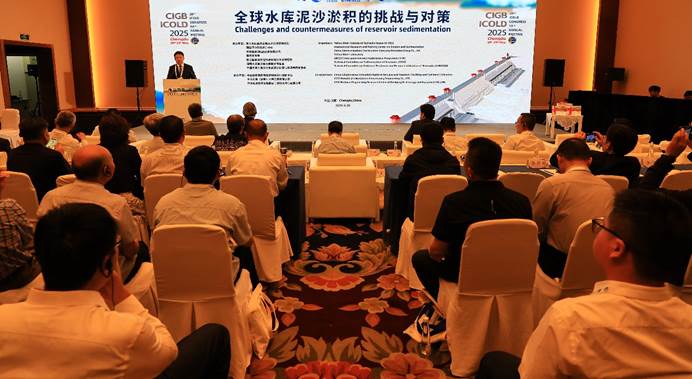
Mr. Qun Li, Deputy
Director of the YRCC, delivering opening speech
Mr. Hamid Nouri,
Director of the International Center for Integrated Management of Water
Resources and Biodiversity in Arid and Semi-arid Regions (ICIMWB) under the auspices
of UNESCO; and Mr. Zhang Jianli, Deputy Director of IRTCES chaired the keynote
speech session and invited speech session, respectively.
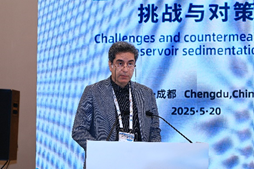
Mr. Hamid Nouri,
co-Chair the Keynote speech
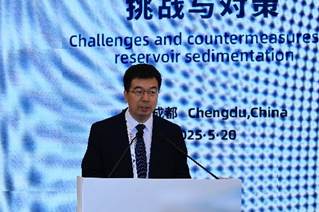
Mr. Jianli Zhang: Chair the Invited
speech
The keynote speeches and invited
speeches come from Mr. Xin Yu, President of YRHR; Mr. Martin J. Teal, President
and Principal Engineer with WEST Consultants, Former Chairman of the
Sedimentation Committee of ICOLD; Mr. Nikolaos Efthymiou, Sediment Management
Expert, World Bank; Mr. A?ssa Mellal, Senior Dam Specialist, World Bank; Mr. Qingbo
Zhang, Vice President of CCCC Dredging Group.; Mr. Jinyou Lu, Former President of the Changjiang River
Scientific Research Institute (CRSRI); and Mr. Qingchao Guo,
Professor at the China Institute of Water Resources and Hydropower Research
(IWHR).
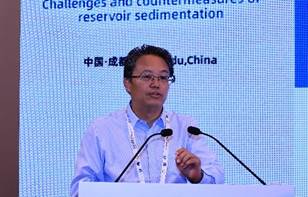
Mr.
Xin Yu: Whole-Process Technologies for Lake and Reservoir Dredging
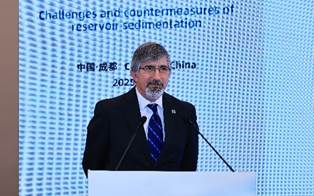
Mr. Martin J. Teal: The Global
Challenges of Reservoir Sedimentation
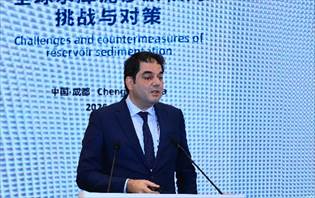
Mr.
Nikolaos Efthymiou: Screening of Reservoir Sedimentation Management
Aleernatives
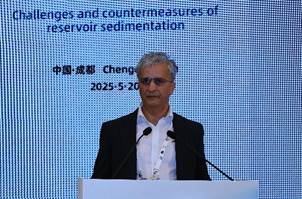
Mr.
A?ssa Mellal:Exploit the potential of
existing dams and reservoirs
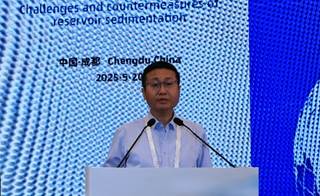
Mr.
Qingbo Zhang: Dredging Technologies and Equipment
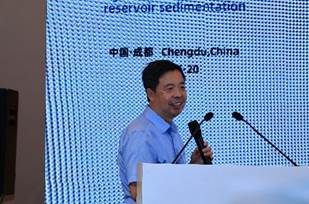
Mr. Jinyou Lu:
Reservoir sedimentation: storage loss rate and alleviation measures
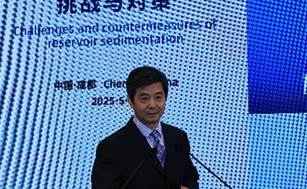
Mr. Qingchao Guo: Reservoir
sedimentation: storage loss rate and alleviation measures
Their
reports covered the latest research achievements in areas such as the mechanisms
of reservoir sedimentation, monitoring technologies for sediment movement, and
technologies and equipment for reservoir sediment reduction and dredging. These
presentations provided important references for exploring effective strategies
to address global reservoir sedimentation risks by integrating cases from China
and other countries in reservoir sedimentation reduction and sediment
utilization.
A panel discussion with the theme
of "Global Reservoir
Sedimentation Risks and Governance Strategies" was attended by Ms. Zhang
Wenjie, Director of the Operation and Management Department of the Ministry of
Water Resources of China; Mr. Martin Thiel; Mr. Sayed Hamidreza Sadeghi, Vice
President of the World Association of Soil and Water Conservation and Professor
at Tarbiat Modares University, Iran; Mr. Zhang Qingbo; and Ms. Jiang Enhui,
Honorary Director of the CDES Committee on Reservoir Sediment Treatment and
Resource Utilization.
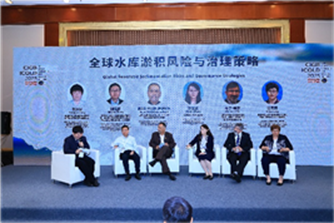
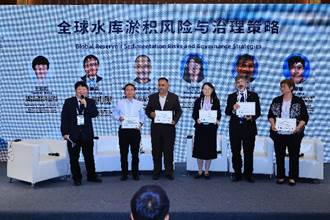
Panel discussion
"Global Reservoir Sedimentation Risks and Governance Strategies"
The panelist delved into specific pathways
for advancing global reservoir sedimentation governance from perspectives
including policy support, technological innovation, and international
cooperation.
The Workshop has achieved fruitful results as
follows:
Participant Impact Stories and Testimonials
- Xin Yu (YRHR President): Highlighted challenges in China’s reservoir desilting, including unclear approval authorities, lack of supporting policies, low sediment disposal/recycling rates, and insufficient funding. Emphasized the need for systemic governance beyond technical solutions.
- Martin J. Teal (Former ICOLD Sedimentation Chair): Stressed that global reservoir sedimentation requires full lifecycle management (from design to operation) to address technical, social, regulatory, financial, and climate-related challenges. Advocated strategies like sediment inflow reduction, optimized sluicing, and mechanical desilting.
- Nikolaos Efthymiou (World Bank Consultant): Focused on the long-term economics of sediment management, analyzing cost-benefit balance over a reservoir’s lifecycle to promote sustainable decision-making.
- A?ssa Mellal (World Bank Senior Dam Expert): Advocated four management approaches—sediment reduction, dredging and diversion, redistribution, and desilting—to extend reservoir lifespan and enhance efficiency, citing their applicability in diverse hydrological contexts.
- Qingbo Zhang (CCCC Dredging VP): Noted China’s ecological desilting technology has evolved into a full suite (surveying, dredging, dewatering, and disposal) with smart, unmanned, and modular equipment. Called for standardized technical and regulatory frameworks to drive industrial collaboration.
- Jinyou Lu (Former President at Yangtze River Scientific Research Institute): Shared the Yangtze River Basin’s "desilting + resource utilization" models at typical Reservoirs, demonstrating sediment recycling for construction and ecological restoration.
- Qingchao Guo (Professor at China Institute of Water Resources and Hydropower Research): Pointed out that the annual average sedimentation loss rate of global reservoirs is approximately 1%, and proposed a governance strategy of "reducing sediment production - hydraulic sediment discharge - dredging sediment".
- Panelists at Roundtable Discussion: Unanimously urged governments to increase R&D funding for sustainable sediment management, foster industry-academia-research integration, and strengthen international cooperation to overcome technical barriers.
Scientific Achievements and Methodologies
1. Full-Chain
Technology for Lake/Reservoir Desilting
- YRHR’s integrated technology
covers desilting, sediment sorting, and resource utilization (e.g.,
converting silt into construction materials), tested in domestic projects
like Xiaolangdi Reservoir.
2. Lifecycle Cost-Benefit Analysis for Sediment Management
- Efthymiou’s framework evaluates
economic viability of sediment management strategies, balancing
short-term investments with long-term benefits (e.g., extended reservoir
lifespan, reduced maintenance costs).
3. Ecological Desilting Equipment and Standards
- CCCC Dredging’s smart, unmanned
dredging systems enable precise, low-impact sediment removal, supporting
China’s standards push for global applicability.
4. Sedimentation Loss Rate Model
- Guo Qingchao’s research revealed a
global average reservoir sedimentation loss rate of ~1% annually, linking
sedimentation to flood control capacity reduction and turbine wear.
Proposed a three-step strategy: sediment production reduction, hydraulic
sluicing, and deposition dredging.
Innovative Highlights and Educational Initiatives
1. Publications and Technical Resources
- Launch of Technical Atlas for Dike Emergency
Treatment (by YRHR), a practical guide for flood control
and embankment management.
2. International Collaboration Agreements
- Signing of a memorandum between
YRHR, Tarbiat Modares University (Iran), and the ICIMWB to collaborate on
arid-zone sediment research and technology transfer.
3. Policy and Standardization Initiatives
- Advocate for cross-border policy
coordination and shared technical standards to address sedimentation as a
transboundary issue.
- Call for standardized desilting
protocols to facilitate global project tendering and environmental
compliance.
4. Capacity Building and Knowledge Sharing
- Regularly
regional technical seminars to promote international joint research
projects and build a resource sharing platform.
- Free training programs targeted at
technicians from developing nations, combining theoretical workshops with
field experiments.
Synthesis
The workshop demonstrated China’s leadership in integrating
technical innovation (e.g., smart dredging, sediment recycling with systemic
governance insights. By highlighting lifecycle management, cross-disciplinary
collaboration, and international exchange and cooperation, participants laid
groundwork for a global framework to tackle reservoir sedimentation as a
critical climate adaptation challenge.
 Program.pdf
Program.pdf

